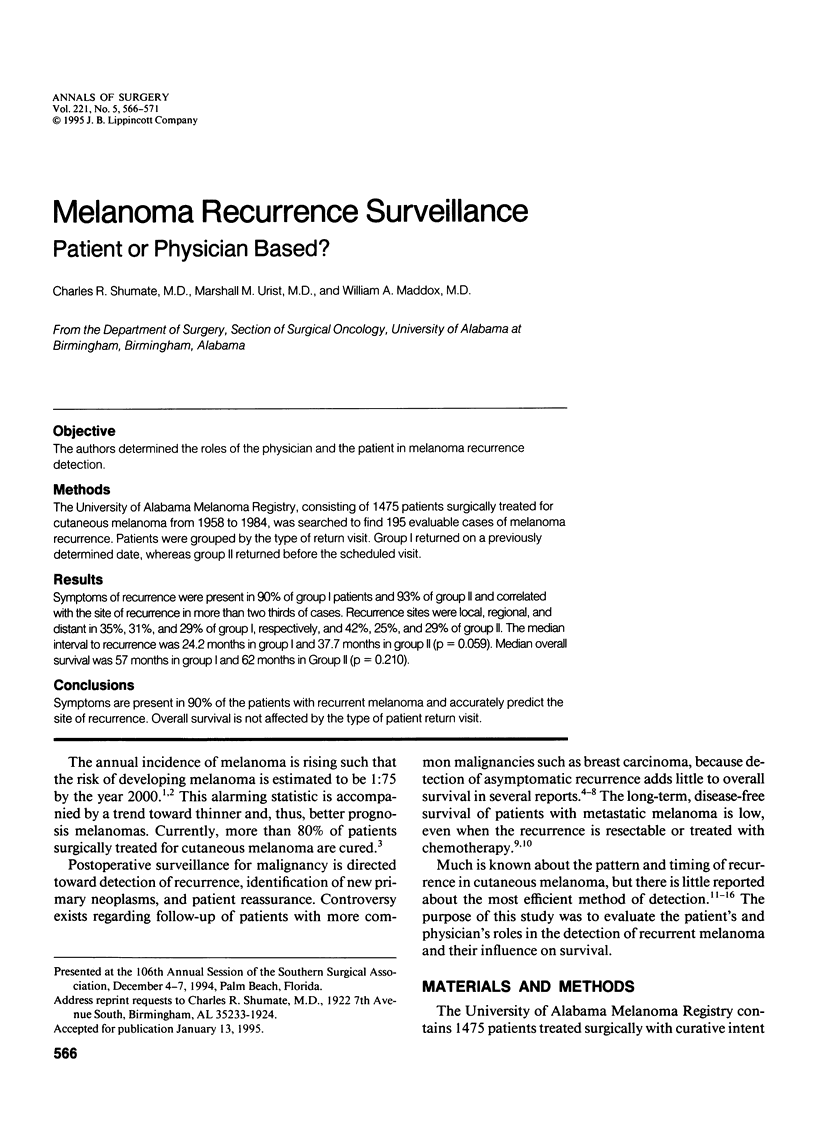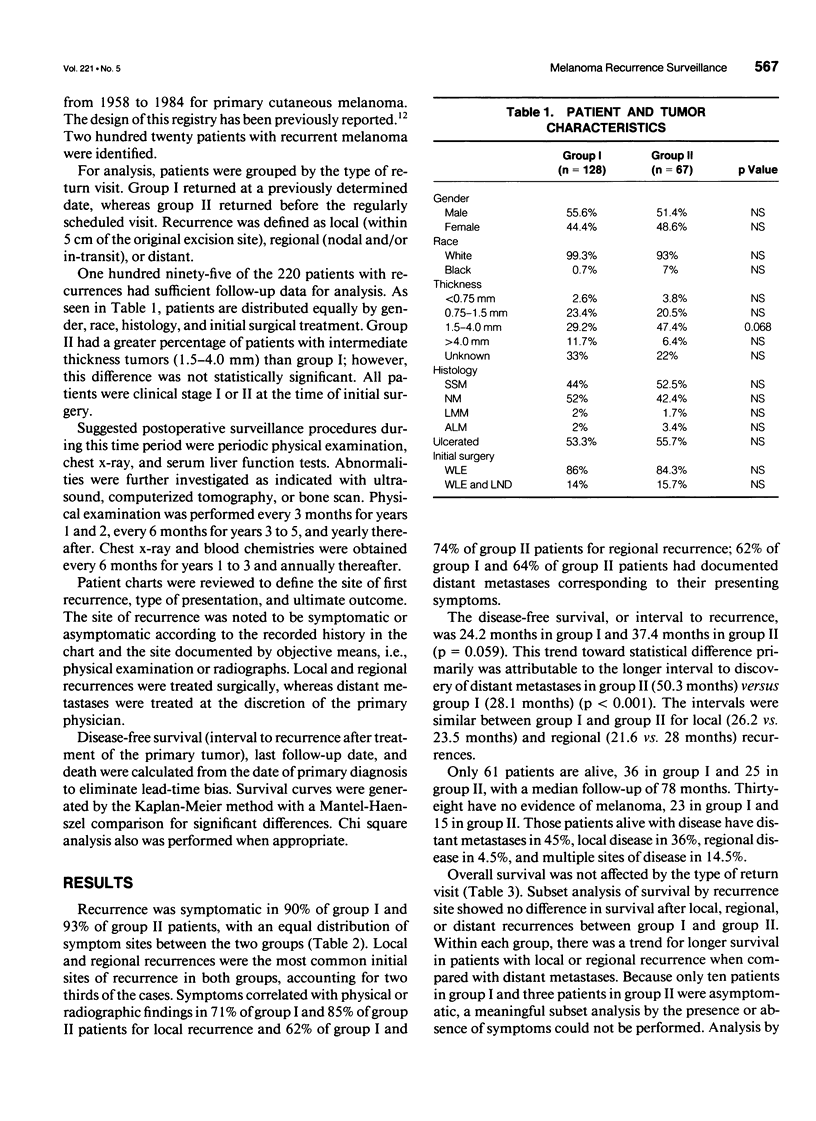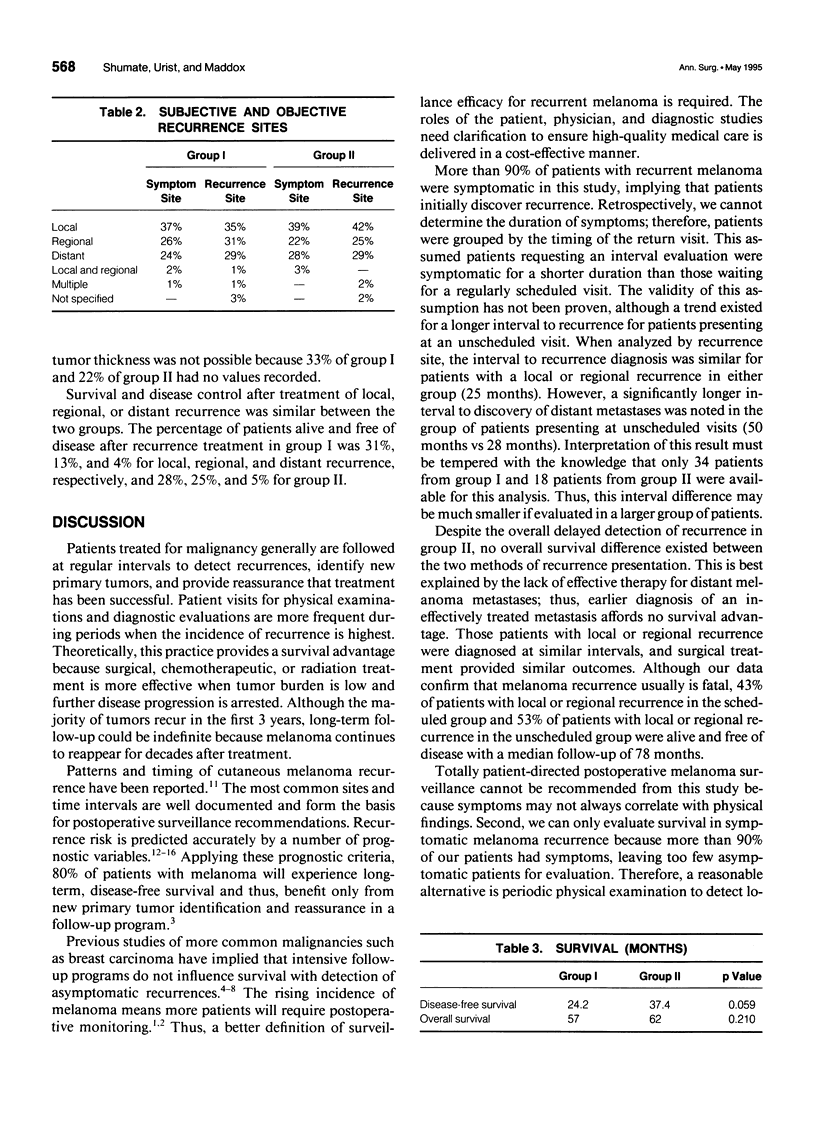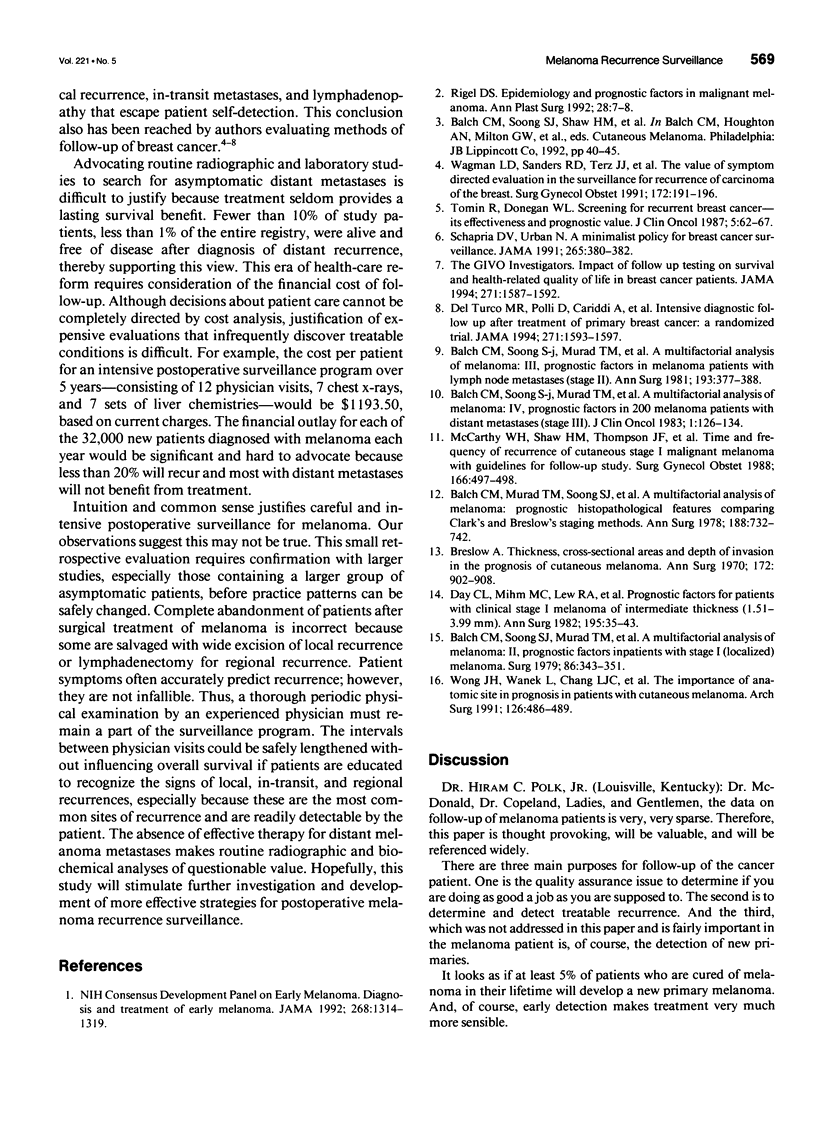Abstract
OBJECTIVE: The authors determined the roles of the physician and the patient in melanoma recurrence detection. METHODS: The University of Alabama Melanoma Registry, consisting of 1475 patients surgically treated for cutaneous melanoma from 1958 to 1984, was searched to find 195 evaluable cases of melanoma recurrence. Patients were grouped by the type of return visit. Group I returned on a previously determined date, whereas group II returned before the scheduled visit. RESULTS: Symptoms of recurrence were present in 90% of group I patients and 93% of group II and correlated with the site of recurrence in more than two thirds of cases. Recurrence sites were local, regional, and distant in 35%, 31%, and 29% of group I, respectively, and 42%, 25%, and 29% of group II. The median interval to recurrence was 24.2 months in group I and 37.7 months in group II (p = 0.059). Median overall survival was 57 months in group I and 62 months in Group II (p = 0.210). CONCLUSIONS: Symptoms are present in 90% of the patients with recurrent melanoma and accurately predict the site of recurrence. Overall survival is not affected by the type of patient return visit.
Full text
PDF



Selected References
These references are in PubMed. This may not be the complete list of references from this article.
- Balch C. M., Murad T. M., Soong S. J., Ingalls A. L., Halpern N. B., Maddox W. A. A multifactorial analysis of melanoma: prognostic histopathological features comparing Clark's and Breslow's staging methods. Ann Surg. 1978 Dec;188(6):732–742. doi: 10.1097/00000658-197812000-00004. [DOI] [PMC free article] [PubMed] [Google Scholar]
- Balch C. M., Soong S. J., Murad T. M., Ingalls A. L., Maddox W. A. A multifactorial analysis of melanoma. II. Prognostic factors in patients with stage I (localized) melanoma. Surgery. 1979 Aug;86(2):343–351. [PubMed] [Google Scholar]
- Balch C. M., Soong S. J., Murad T. M., Ingalls A. L., Maddox W. A. A multifactorial analysis of melanoma: III. Prognostic factors in melanoma patients with lymph node metastases (stage II). Ann Surg. 1981 Mar;193(3):377–388. doi: 10.1097/00000658-198103000-00023. [DOI] [PMC free article] [PubMed] [Google Scholar]
- Balch C. M., Soong S. J., Murad T. M., Smith J. W., Maddox W. A., Durant J. R. A multifactorial analysis of melanoma. IV. Prognostic factors in 200 melanoma patients with distant metastases (stage III). J Clin Oncol. 1983 Feb;1(2):126–134. doi: 10.1200/JCO.1983.1.2.126. [DOI] [PubMed] [Google Scholar]
- Breslow A. Thickness, cross-sectional areas and depth of invasion in the prognosis of cutaneous melanoma. Ann Surg. 1970 Nov;172(5):902–908. doi: 10.1097/00000658-197011000-00017. [DOI] [PMC free article] [PubMed] [Google Scholar]
- Day C. L., Jr, Mihm M. C., Jr, Lew R. A., Harris M. N., Kopf A. W., Fitzpatrick T. B., Harrist T. J., Golomb F. M., Postel A., Hennessey P. Prognostic factors for patients with clinical stage I melanoma of intermediate thickness (1.51 - 3.39 mm). A conceptual model for tumor growth and metastasis. Ann Surg. 1982 Jan;195(1):35–43. doi: 10.1097/00000658-198201001-00006. [DOI] [PMC free article] [PubMed] [Google Scholar]
- Impact of follow-up testing on survival and health-related quality of life in breast cancer patients. A multicenter randomized controlled trial. The GIVIO Investigators. JAMA. 1994 May 25;271(20):1587–1592. doi: 10.1001/jama.1994.03510440047031. [DOI] [PubMed] [Google Scholar]
- McCarthy W. H., Shaw H. M., Thompson J. F., Milton G. W. Time and frequency of recurrence of cutaneous stage I malignant melanoma with guidelines for follow-up study. Surg Gynecol Obstet. 1988 Jun;166(6):497–502. [PubMed] [Google Scholar]
- Rigel D. S. Epidemiology and prognostic factors in malignant melanoma. Ann Plast Surg. 1992 Jan;28(1):7–8. doi: 10.1097/00000637-199201000-00003. [DOI] [PubMed] [Google Scholar]
- Rosselli Del Turco M., Palli D., Cariddi A., Ciatto S., Pacini P., Distante V. Intensive diagnostic follow-up after treatment of primary breast cancer. A randomized trial. National Research Council Project on Breast Cancer follow-up. JAMA. 1994 May 25;271(20):1593–1597. doi: 10.1001/jama.271.20.1593. [DOI] [PubMed] [Google Scholar]
- Schapira D. V., Urban N. A minimalist policy for breast cancer surveillance. JAMA. 1991 Jan 16;265(3):380–382. [PubMed] [Google Scholar]
- Tomin R., Donegan W. L. Screening for recurrent breast cancer--its effectiveness and prognostic value. J Clin Oncol. 1987 Jan;5(1):62–67. doi: 10.1200/JCO.1987.5.1.62. [DOI] [PubMed] [Google Scholar]
- Wagman L. D., Sanders R. D., Terz J. J., Beatty J. D., Kokal W. A., Riihimaki D. U. The value of symptom directed evaluation in the surveillance for recurrence of carcinoma of the breast. Surg Gynecol Obstet. 1991 Mar;172(3):191–196. [PubMed] [Google Scholar]
- Wong J. H., Wanek L., Chang L. J., Goradia T., Morton D. L. The importance of anatomic site in prognosis in patients with cutaneous melanoma. Arch Surg. 1991 Apr;126(4):486–489. doi: 10.1001/archsurg.1991.01410280090013. [DOI] [PubMed] [Google Scholar]


